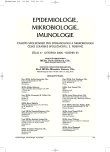-
Medical journals
- Career
Comments on Antiphospholipid Antibody Tests
Authors: K. Malíčková 1,2; P. Šandová 1; I. Janatková 1,2
Authors‘ workplace: Všeobecná fakultní nemocnice a 1. lékařská fakulta Univerzity Karlovy v Praze ; Ústav klinické biochemie a laboratorní diagnostiky, Klinická imunologie a alergologie – laboratoř 1; Ústav imunologie a mikrobiologie 2
Published in: Epidemiol. Mikrobiol. Imunol. 55, 2006, č. 4, s. 158-163
Overview
The Lancet was the first to report the use of anticardiolipin antibody test in a group of patients at risk of recurrent arterial and/or venous thrombosis and recurrent pregnancy losses, 23 years ago. The condition characterized by specific clinical and laboratory signs and initially called the anticardiolipin syndrome came to be known as the antiphospholipid syndrome (APS) when crossreactivity of cardiolipin with other phospholipids was revealed. The study of APS still arouses controversy. Even after two decades of research, there is disagreement on the standardisation and interpretation of antiphospholipid antibody (APLA) test results. More international workshops have been organized on APLA tests than on any other autoantibody test. However, there is still wide interlaboratory variation in APLA detection. Therefore, comprehensive quality control procedures have to be integrated into the routine workload of laboratories performing APLA analysis. Participation in an external quality assessment (EQA) scheme is essential for any laboratory seeking to maintain and provide quality service.
Key words:
antiphospholipid syndrome – antiphospholipid antibodies – standardisation – external quality assessment
Labels
Hygiene and epidemiology Medical virology Clinical microbiology
Article was published inEpidemiology, Microbiology, Immunology

2006 Issue 4-
All articles in this issue
- Microbiology Online – Interactive Learning and a New Discussion Forum for Microbiology Teachers
- Mumps – a Reemerging Infection? The Current Incidence of Mumps in the East Bohemian Region in the Czech Republic
- Prevalence of Hepatitis G Virus (HGV) in Intravenous Immunoglobulin Recipients in the Czech Republic
- Molecular Epidemiology of Invasive Meningococcal Disease in the Czech Republic
- Nontuberculous Mycobacteria and Incidence of Mycobacterioses in Prague in 1999–2004
- Comments on Antiphospholipid Antibody Tests
- Epidemiology, Microbiology, Immunology
- Journal archive
- Current issue
- Online only
- About the journal
Most read in this issue- Mumps – a Reemerging Infection? The Current Incidence of Mumps in the East Bohemian Region in the Czech Republic
- Microbiology Online – Interactive Learning and a New Discussion Forum for Microbiology Teachers
- Prevalence of Hepatitis G Virus (HGV) in Intravenous Immunoglobulin Recipients in the Czech Republic
- Nontuberculous Mycobacteria and Incidence of Mycobacterioses in Prague in 1999–2004
Login#ADS_BOTTOM_SCRIPTS#Forgotten passwordEnter the email address that you registered with. We will send you instructions on how to set a new password.
- Career

